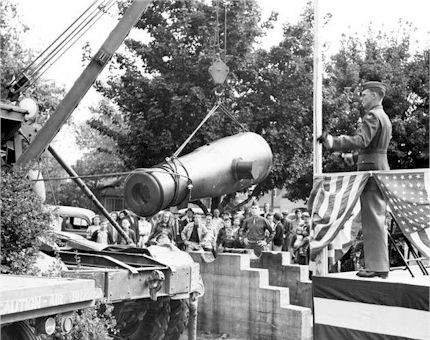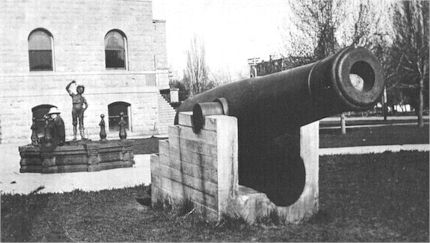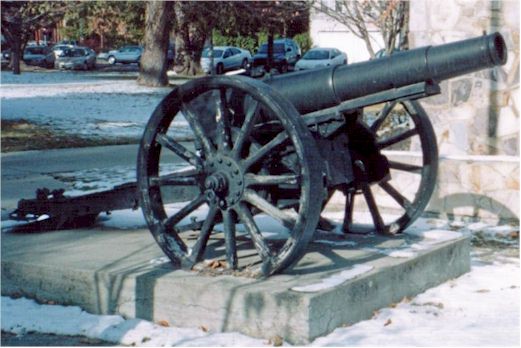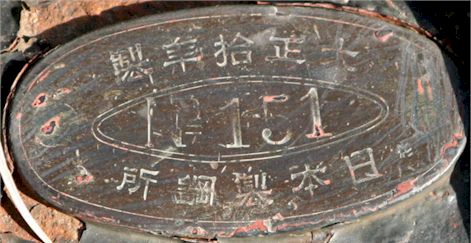|
|
 |
|
Memorial Cannon is
Being Moved Today
W.H. Ellis is moving the Columbiad Cannon from the
railroad to its place on the court house grounds today.
This no inconsiderable task as the big gun weighs 15,535
pounds. It was made in 1854. Parrott brothers will
commence Monday the work of constructing the concrete
base for the gun. This will be five feet in height. Both
concerns are performing these services without charge.
From the Pearl Jones files located at the Baker County
Library, Baker City,
Source: Baker Herald September 29, 1911 Page 1
Contributed by Gary Jaensch |
 |
Cannon and Boy with
Boot in Courthouse Yard |
From information located in book the
"History of Baker County Government" it is noted
information from this article" Our County" In 1908,
under the leadership of County Judge J.B. Messick, the
County began construction of the third and present
courthouse, a three-story building made of the same
local stone used a couple of years earlier in the new
city hall and Catholic Cathedral. It included a clock
tower, and, at that time, a jail on the third floor. The
grounds were graced with two items which have special
historical interest the cannon and the statue.
The original cannon was a piece of heavy artillery, a
relic of either the Civil War or the Spanish American
War. Many years later, County Judge Charles Baird, on
behalf of the citizens of Baker County, donated that
cannon for scrap metal as part of the war effort in the
early days of World War II. A rousing farewell was given
the cannon by local residents, complete with martial
music and a long and profane acceptance speech from a
uniformed military officer.
The cannon presently on the east lawn of the courtyard
was a post war replacement of unknown origin, but
thought to have been from the Imperial Japanese Army.
After a Halloween prank in which the cannon was used to
fire buckets of nails, chains and other assorted
metallic junk into the roof of a nearby church, County
authorities sealed the barrel and firing pin to prevent
future use of the cannon.
 |
 |
Made in the 10th Year
of The Taisho Era.
(Taisho Era is 1912-1926 during the reign of the Emperor
Yoshihito.
Converting the dates into a western calendar, the 10th
year of the
Taisho era was 1921)
Bottom letters: Japan Steel Works, Ltd. |
Additional information on
this type of cannon:
Confederate Cannons
Found on Shipwreck
The burial of the H.L. Hunley crew isn't
the only Civil War news in South Carolina this week.
Archaeologists are drooling over the discovery of what
may be the single largest collection of Confederate
cannon found since the war ended.
The Long Bay Salvage Co. of Murrells Inlet has been
granted ownership of a shipwreck containing at least 24
large-bore cannons, recording their find in waters off
Cape Romain.
At least four of the heavy guns have been recovered and
cleaned. Officials say they likely played a role in the
defense of Charleston.
In June 2001, searchers located a sunken barge
containing railroad rails, railcar wheels, a locomotive
cow-catcher, and at least 24 guns. The barge is believed
to have been lost at sea in the 1890s, and was moving
outbound from Charleston carrying materials, which at
the time was considered post-war scrap, said Marc
Marling, an attorney for the company.
Long Bay Salvage filed a lawsuit in U.S. District Court
for the Southern District of Georgia to gain ownership
of the barge and its contents. It was granted ownership
in September 2003. So far the company has recovered four
cannons.
One of the guns is a 10-inch Columbiad cast in 1863 at
the Belona Foundry, a small foundry outside Richmond,
VA, with a serial number of 22.
An identical Columbiad cannon, serial number 20, is at
Magnolia Cemetery in Charleston where the remains of the
final eight Hunley crew were buried recently.
Until the discovery of the wreck, 18 10-inch Columbiads
were known to exist.
According to historical records, there were possibly 70
10-inch Columbiads shipped directly from Richmond to
Charleston where they were likely put to use keeping
Union ships at bay.
"This is undoubtedly the largest single collection of
Confederate cannon to be discovered since shortly after
the Civil War, and its eventual disclosure will create
great interest among Civil War historians and
aficionados," said Wayne E. Stark, a Civil War artillery
historian.
Long Bay Salvage is developing a plan to recover the
remaining cannons, Marlins said.
From The Post and Courier, submitted by Stephen & Julie
Buckler, Walterboro, SC.
Source: The History of Baker County Oregon.
Published by The Baker County Historical Society
Copyright 1986 by The Baker County Historical Society
(Used with permission)
Contributed by: Gary Jaensch - Baker City, Oregon
Baker City
Boy with the Boot
| Post Cards and Photos |
|
|
|
|
Baker County Towns |
|
|
|
Oregon Counties |
|
|
|
Oregon Genealogy Records |
|
|
|
Other Genealogy Records |
|
|
|

Oregon Host |
Contribute to Oregon Genealogy
If you have information you would like contribute to
the website, please use our comment form!! If you find a broken link
please let us know! |
|